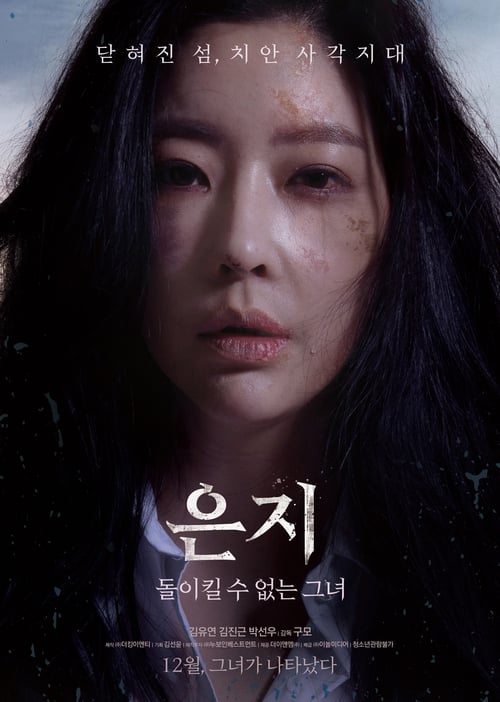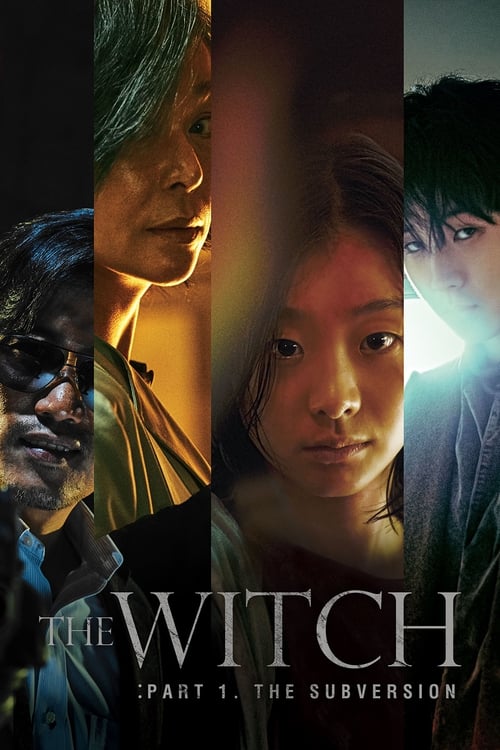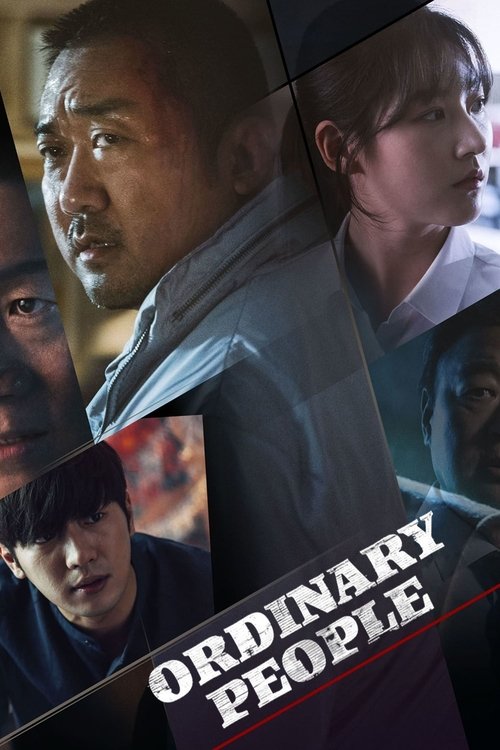
Ask Your Own Question
What is the plot?
The film Eun-ji: Dol-il-kil su eobs-neun geu-nyeo (2019) opens with a serene, almost haunting view of Yeonmo Island, an isolated fishing village surrounded by endless sea and rugged cliffs. The atmosphere is calm but heavy with an unspoken tension, as the camera lingers on the natural beauty that contrasts sharply with the darkness about to unfold.
Eun-ji (Kim Yoo-yeong) arrives alone on this island, carrying a guitar slung over her shoulder and scuba diving gear in hand. She moves quietly, her demeanor reserved and introspective, as if seeking refuge from a painful past. Her first moments on the island are peaceful--she swims in the clear waters, strums her guitar by the shore, and explores the natural landscape, trying to find solace in the isolation.
However, the island's men, led by Yong-tae (Kim Jin-geun), the self-appointed president of the island, quickly take notice of her presence. Yong-tae is a domineering figure who rules the village with an iron fist, his authority unquestioned by the fishermen and villagers. His right-hand man, Byeong-sam (Sung Hong-il), is ever-present, silently observing Eun-ji with a cold loyalty to Yong-tae. Yoon-gil (Baek Seung-chul), another subordinate, is more overtly aggressive and lecherous, openly making crude remarks about Eun-ji and watching her every move. The local police officer, Constable Kim (Ju Min-Chan), embodies the island's ambiguous authority--he is both protector and participant in the corruption that festers beneath the village's surface.
From the outset, Eun-ji faces hostility veiled beneath the island's quiet exterior. Yong-tae confronts her directly, his voice low and menacing, "This island is no place for someone like you. You don't belong here." His tone brooks no argument, and the message is clear: Eun-ji is an outsider, and her presence disrupts the fragile order maintained by Yong-tae and his cronies.
Despite the warnings, Eun-ji remains, trying to carve out a space for herself. She spends her days swimming alone, her scuba gear a symbol of her attempt to escape her reality, and her guitar a fragile comfort. But the men's harassment escalates. Byeong-sam and Yoon-gil follow her, their threats growing more explicit. Eun-ji's vulnerability becomes painfully clear as she navigates the island's toxic atmosphere.
The tension reaches a horrifying peak when Eun-ji is brutally gang-raped by Yong-tae, Byeong-sam, Yoon-gil, and other villagers. The assault is a devastating act of violence that shatters her fragile refuge. The film does not shy away from the trauma, portraying the assault with raw, unflinching intensity. Eun-ji's screams echo against the cliffs, a haunting sound that contrasts with the earlier peaceful scenes.
In the aftermath, Eun-ji's physical and emotional state deteriorates rapidly. The trauma inflicted upon her is overwhelming, and the island's corrupt power structure ensures that justice is nowhere to be found. Constable Kim, rather than protecting her, is complicit in the cover-up, his silence a testament to the island's deep-seated corruption.
As Eun-ji's condition worsens, the film reveals her backstory through fragmented flashbacks and dialogue--she fled to Yeonmo Island seeking peace from a previous trauma, only to encounter a new nightmare. These revelations deepen the tragedy, showing how her past and present pains intertwine.
The islanders' motives are laid bare: greed, lust, and a desperate desire to maintain their insular community at any cost. Yong-tae's dominance is rooted in toxic masculinity and fear of outsiders, driving the violent acts that tear the village apart.
The climax unfolds on the beach and cliffs of Yeonmo Island, where the natural landscape becomes a stage for chaos and retribution. A violent confrontation erupts between Eun-ji's few allies--those who refuse to accept the corruption--and the villagers loyal to Yong-tae. In the melee, Yong-tae, Byeong-sam, and Yoon-gil are killed, their deaths brutal and symbolic of the island's decaying power structure collapsing under its own weight.
Eun-ji herself succumbs to her injuries and trauma, dying as a direct result of the assault. Her death is the film's darkest moment, yet it is also the catalyst for the island's reckoning. The villagers who survive are left to face the consequences of their actions, their complicity exposed and their community irrevocably fractured.
The final scenes return to the island's calm, now eerily silent and empty. The camera lingers on the natural beauty of Yeonmo Island--the cliffs, the sea, the deserted village--juxtaposed with the horror that has transpired. The film closes on a somber note, a haunting reminder of the cost of corruption and the resilience of those who seek justice, even when it comes too late.
Throughout the film, key objects--the guitar and scuba gear--serve as poignant symbols of Eun-ji's fragile hope and desire for escape, while the police station stands as a grim emblem of authority corrupted and justice denied.
In Eun-ji, every confrontation, every death, and every revelation builds a relentless momentum toward a climax that is as tragic as it is inevitable. The story is a stark, unflinching portrayal of violence, power, and the devastating consequences of silence and complicity in a closed community.
What is the ending?
In the ending of the movie "Eun Ji," Eun Ji confronts her past and the trauma that has haunted her. She finds a sense of closure and acceptance, leading to a poignant reunion with her family. The film concludes with a sense of hope as Eun Ji steps into a new chapter of her life, having reconciled her inner turmoil.
As the final act unfolds, the scene opens with Eun Ji standing alone in her childhood home, the walls echoing with memories of her past. The air is thick with nostalgia and unresolved pain. She gazes at the family photographs that line the walls, each image a reminder of the love and loss she has experienced. The camera lingers on her face, capturing the flicker of emotions--sadness, longing, and a glimmer of hope.
In the next scene, Eun Ji receives a phone call from her estranged mother, who has been trying to reach out to her. The conversation is tense at first, filled with unspoken words and lingering resentment. Eun Ji's voice trembles as she struggles to express her feelings, but as the dialogue progresses, the walls between them begin to crumble. The emotional weight of their shared history hangs in the air, and Eun Ji's vulnerability shines through as she finally articulates her pain and longing for connection.
The scene shifts to a park where Eun Ji and her mother agree to meet. The atmosphere is charged with anticipation and anxiety. As Eun Ji approaches, her heart races, and she takes a deep breath, steeling herself for the confrontation. When they finally see each other, the moment is heavy with unspoken words. Tears well up in Eun Ji's eyes as she embraces her mother, a gesture that signifies both forgiveness and the desire to heal.
In the following scene, Eun Ji's father joins them, creating a tense but necessary family reunion. The three of them sit on a park bench, the sunlight filtering through the leaves, casting a warm glow around them. They share stories, laughter, and tears, slowly bridging the gap that years of silence had created. Eun Ji's father expresses his regret for not being there for her, and Eun Ji, in turn, acknowledges her own struggles with acceptance. The dialogue is raw and honest, revealing the depth of their emotional scars.
As the reunion progresses, the camera captures the subtle shifts in their body language--Eun Ji's shoulders relax, her smile becomes more genuine, and her laughter rings out, a sound that had been absent for too long. The scene is interspersed with flashbacks of happier times, juxtaposing the past with the present, highlighting the journey of healing they are all undergoing.
The film culminates in a final scene where Eun Ji stands at the edge of a cliff overlooking the ocean, the wind tousling her hair. She closes her eyes, taking in the sound of the waves crashing below, symbolizing the release of her burdens. The camera pans out, revealing her silhouette against the vastness of the sea, a visual metaphor for her newfound freedom and acceptance.
As the credits roll, the audience is left with a sense of hope and renewal. Eun Ji's journey has come full circle; she has faced her demons, reconciled with her family, and is ready to embrace the future. The film ends on a note of optimism, suggesting that healing is possible, and that love can prevail even in the face of deep-seated pain. Each character, having confronted their past, is poised to move forward, embodying the film's central theme of resilience and the power of familial bonds.
Is there a post-credit scene?
In the movie "Eun Ji," produced in 2019, there is no post-credit scene. The film concludes its narrative without any additional scenes after the credits roll. The story wraps up with a poignant resolution that encapsulates the emotional journey of the characters, particularly focusing on Eun Ji's growth and the relationships she has navigated throughout the film. The absence of a post-credit scene allows the audience to reflect on the themes of love, loss, and personal transformation that are central to the film's message.
What motivates Eun Ji to pursue her dreams despite the challenges she faces?
Eun Ji is driven by a deep desire to prove herself and escape the limitations imposed by her circumstances. Her passion for music serves as both an emotional outlet and a source of strength, pushing her to confront her fears and insecurities.
How does Eun Ji's relationship with her family influence her decisions throughout the film?
Eun Ji's relationship with her family is complex; she feels a strong sense of responsibility towards them, which often conflicts with her personal aspirations. Her family's expectations weigh heavily on her, leading to moments of tension and self-doubt, but ultimately, their support becomes a crucial element in her journey.
What role does the character of Min Soo play in Eun Ji's development?
Min Soo serves as both a mentor and a love interest for Eun Ji. His encouragement and belief in her talent help her gain confidence, while their evolving relationship adds emotional depth to her journey, highlighting themes of trust and vulnerability.
How does Eun Ji cope with setbacks in her career, and what specific events trigger her resilience?
Eun Ji faces several setbacks, including rejection from music competitions and personal losses. Each setback triggers a moment of introspection, where she reflects on her motivations and the sacrifices she has made, ultimately fueling her determination to rise again and pursue her dreams.
What specific challenges does Eun Ji encounter in the music industry, and how do they shape her character?
Eun Ji encounters various challenges, such as fierce competition, industry politics, and the pressure to conform to commercial expectations. These experiences test her resolve and force her to navigate her identity as an artist, shaping her into a more resilient and authentic individual.
Is this family friendly?
"Eun Ji," produced in 2019, is a film that explores deep emotional themes and complex family dynamics. While it is not explicitly categorized as a children's movie, it does contain elements that may be suitable for older children or teens with parental guidance.
Potentially objectionable or upsetting aspects include:
-
Emotional Turmoil: The film delves into themes of loss, grief, and familial conflict, which may be intense for younger viewers or sensitive individuals.
-
Family Struggles: Scenes depicting arguments or misunderstandings between family members can be distressing, as they highlight the pain of broken relationships.
-
Mental Health Themes: The film touches on issues related to mental health, which may be challenging for some viewers to process.
-
Tense Situations: There are moments of high emotional tension that could evoke feelings of anxiety or discomfort.
-
Realistic Portrayals of Life Challenges: The film does not shy away from showing the struggles of everyday life, which may resonate deeply and evoke strong emotions.
Overall, while "Eun Ji" offers a poignant narrative, its emotional depth and mature themes may not be suitable for very young audiences or those who are particularly sensitive to such topics.

























